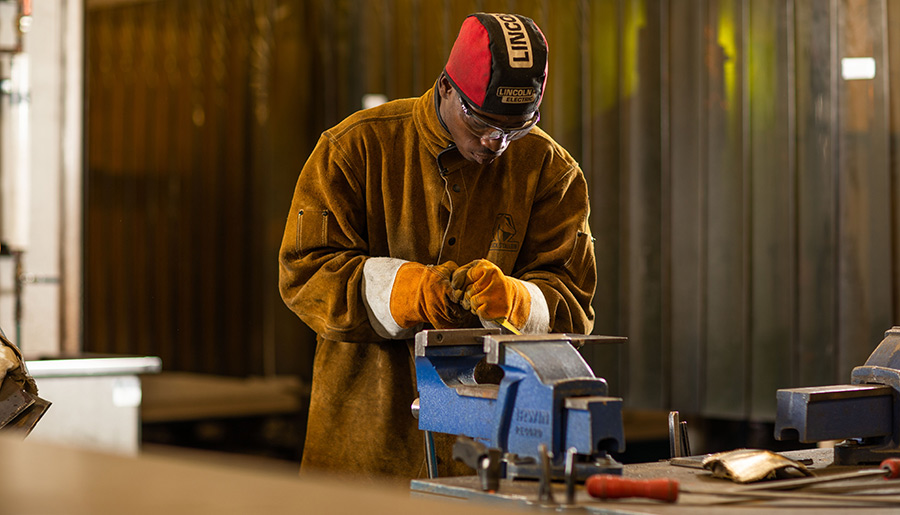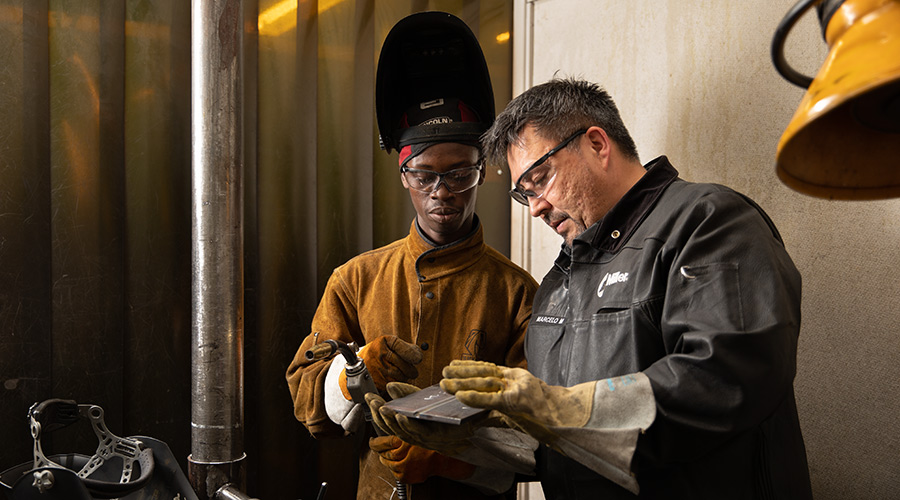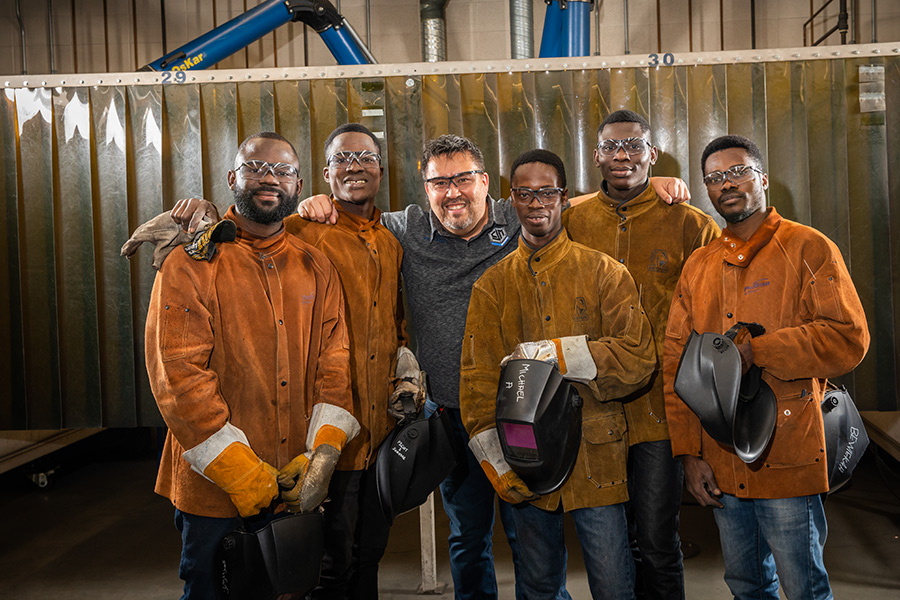Students will return home to work and teach
Wearing identical tan leather coats, red and black caps and welding helmets, the five young men working side-by-side in the shop at NAIT’s Souch Campus look like some kind of industrial cheer team.
In a way, they are. This group of ambitious and adventurous men have come to Edmonton from Ghana to gain new skills and, ultimately, help other Ghanaians succeed in the lucrative oil and gas economy.
Hand-picked from technical schools across the West African country by Ghana’s Petroleum Commission, the students have been at NAIT since late July. They are pioneers in a training program aimed at giving Ghana’s best and brightest the welding skills they need to work in the country’s burgeoning industry. The Petroleum Commission is responsible for regulating, monitoring and managing all the oil and gas exploration and production in Ghana.
“My job is to train and make Ghana proud.”
“My job is to train and make Ghana proud,” says Bright Oduro, 28, who left his wife and infant son to participate in the 10-month program. “When I return, I’ll be working and teaching. That’s my dream – I want to take my knowledge and share it. There’s lots of youth there who would love to do this job.”
 That’s the goal of the program, explains Ignacio Garcia with NAIT’s Corporate and International Training office. He worked with the Ghanaian government and CPI Training, a project management firm with operations in the country’s capital, Accra, to set up the program.
That’s the goal of the program, explains Ignacio Garcia with NAIT’s Corporate and International Training office. He worked with the Ghanaian government and CPI Training, a project management firm with operations in the country’s capital, Accra, to set up the program.
“NAIT’s role is to train this group of students up to international standards. The oil and gas sector in Ghana is expanding, but most of the advanced welding is handled by foreign companies importing their workforce, leaving few [skilled] jobs for the local welders.”
“These young men are extremely bright, so the potential down the road is for them to be leaders in the industry.”
Several of the men had some basic welding skills when they arrived but had never trained formally or worked with advanced equipment, says Marcelo Mena, the welding instructor teaching the Ghanaian students until the end of April. Each had to go through a series of applications, tests and interviews before being chosen.
“These young men are extremely bright, so the potential down the road is for them to be leaders in the industry,” Mena says.
They’ve impressed him so far with their willingness to learn, though it took them a while to overcome their deference to teachers and start asking questions, Mena adds. “In their culture, you don’t challenge leaders or elders. It took them some time to understand it was OK to ask me to repeat or explain.”
Cultural guides
Staff from NAIT Corporate and International Training took the men to buy their matching jackets, work boots, gloves, safety glasses and other gear when they first arrived, and introduced them to pizza and hamburgers.
Mena also took the men to a local African restaurant where they were thrilled to find familiar food and music. “They were so happy, they were dancing like crazy,” he says with a laugh.

“He’s been the best instructor,” says Abdul Rahman Dayankrah, 30. “I’ve learned so much from him. It’s a privilege to find ourselves at one of the best technical [institutes] in North America.” The focus on occupational safety has been particularly helpful and eye-opening for them, he adds.
Oduro says he had long dreamed of coming to Canada, even before the opportunity came from the Petroleum Commission. “Frankly speaking, I didn’t have any hope that I would be selected,” he says.
After their time at NAIT, the students will spend a month in Nisku earning their certification through the Canadian Welding Bureau. “When they go back home, they want to make sure they’ve got those credentials,” Mena says.
No longer strangers in a strange land
The welders live in a five-bedroom house within walking distance of Souch Campus. They share their home, their workspace, and sometimes, a longing for friends and family back home.
“They’ve all had their moments,” says Mena, who can tell when homesickness hits them. He too was a newcomer to this country, arriving from Chile in 1976. He’s encouraged them to try something uniquely Canadian each weekend, like eating poutine, or going to a NAIT Ooks basketball or hockey game. They’re already enamoured with West Edmonton Mall, he adds.
“We are a family, for real … We take care of each other.”
“He’s like a father to us,” says Dayankrah. His fellow students, who were all strangers to each other before they were chosen for the program, have become more than friends.
“We are a family, for real,” he says. “We take care of each other.”
